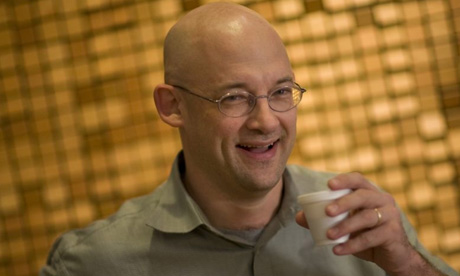A self-confessed 'pretty unlikely early adopter', the digital guru Clay Shirky still proved to be uncannily prescient about the impact of the web - which is why Tom Teodorczuk is getting his media forecast for 2009

Clay Shirky, with his bald head and composed manner, bears a resemblance to REM's frontman, Michael Stipe, and his prognosis for the future of the media industry could be encapsulated in the titles of two REM songs - Monster and Shiny Happy People. On the one hand, the leading web thinker and adjunct professor of New York University predicts further gloom for traditional media: "2009 is going to be a bloodbath." Yet he foresees that a recession may produce greater industry clarity by forcing radical action, which he explains as a boss saying to staff: "'Bonfire, this is Hail Mary time!', instead of: 'This year we made as much money as last year but we're still restructuring dramatically.'"
Much of the success of Shirky's recent book, Here Comes Everybody, about internet technologies and the effects of mass democratisation of the web, came from its simplicity and the absence of jargon. "As with the printing press, the loss of professional control will be bad for many of society's core institutions," he writes. In conversation he is just as plain-speaking, saying, for example, that "Management has a hard time destroying parts of its business unless the alternative, obvious to everyone, is that there is no choice." Based in the unlikely environs of NYU's Interactive Telecommunications Program, a stone's throw from a fusty independent bookstore in downtown Manhattan, rather than Silicon Valley, Shirky, 44, is unburdened by traditional media ties. After Yale, he worked as a painter and theatre director before becoming ensnared by the web in the early 90s thanks to his mother, a research librarian. He has consulted at News International and lists the BBC as a current client. "The advantage I had over people in the traditional media industry is precisely what I didn't know," he says. "I was a pretty unlikely early adopter."
No one, of course, can know what a future media landscape will look like. But, given that Shirky was among the few to have forecast 15 years ago that classified advertising would be sold online rather than via a newspaper ad, his crystal ball is more estimable than most others. This is his forecast:
Newspapers
The great misfortune of newspapers in this era is that they were such a good idea for such a long time that people felt the newspaper business model was part of a deep truth about the world, rather than just the way things happened to be. It's like the fall of communism, where a lot of the eastern European satellite states had an easier time because there were still people alive who remembered life before the Soviet Union - nobody in Russia remembered it. Newspaper people are like Russians, in a way.
Jeff Jarvis said it beautifully: "If you can't imagine anyone linking to what you're about to write, don't write it." The things that the Huffington Post or the Daily Beast have are good storytelling and low costs. Newspapers are going to get more elitist and less elitist. The elitist argument is: "Be the Economist or New Yorker, a small, niche publication that says: 'We're only opening our mouths when what we say is demonstrably superior to anything else on the subject.'" The populist model is: "We're going to take all the news pieces we get and have an enormous amount of commentary. It's whatever readers want to talk about." Finding the working business model between them in that expanded range is the new challenge.
Why pay for it at all? The steady loss of advertising revenue, accelerated by the recession, has normalised the idea that it's acceptable to move to the web. Even if we have the shallowest recession and advertising comes back as it inevitably does, more of it will go to the web. I think that's it for newspapers. What we saw happen to the Christian Science Monitor [the international paper shifted its daily news operation online] is going to happen three or four dozen times (globally) in the next year. The 500-year-old accident of economics occasioned by the printing press - high upfront cost and filtering happening at the source of publication - is over. But will the New York Times still exist on paper? Of course, because people will hit the print button.
http://www.guardian.co.uk/media/2009/jan/05/clay-shirky-future-newspapers-digital-media




No comments:
Post a Comment